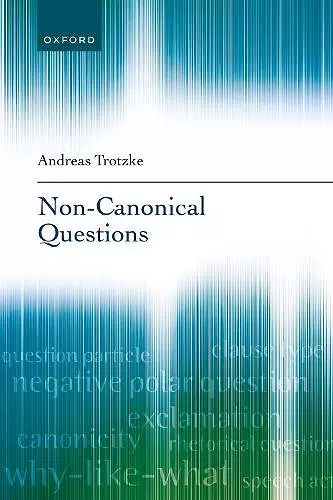Non-Canonical Questions
Format:Hardback
Publisher:Oxford University Press
Published:16th Nov '23
Currently unavailable, and unfortunately no date known when it will be back

This book is the first to present a comprehensive theory of non-canonical questions, those question types that do not (only) request information from the addressee, but rather (additionally) tell us something about the speaker's epistemic and/or emotional state, such as can't-find-the-value questions, echo questions, rhetorical questions, and surprise questions. While much recent research has explored the formal semantics and the phonetics and phonology of both canonical and non-canonical questions, the literature is still lacking a comprehensive account from a syntax-pragmatics perspective that brings together the multiple findings and strands of research from the last twenty years. The standard view in the syntax-pragmatics literature is that most special interpretations of non-canonical questions involve syntactic projections at or even above the level of illocutionary force. In this work, Andreas Trotzke argues that this approach is a mistake, and proposes a new alternative theory of non-canonical questions in which both their special pragmatics and their syntax, as well as in many cases their emotive component, can be derived solely from propositional-level operators that do not affect the illocutionary level of utterances and can be found across illocutionary forces. This account dramatically simplifies the syntactic analysis of non-canonical questions and is also able to capture some previously unobserved data in the discourse behavior of those question types.
Adopting a syntactic approach, Andreas Trotzke provides a detailed account of all the main types of non-canonical questions - in situ questions, declarative questions, exclamatory questions - from a crosslinguistic perspective. Teasing apart emphasis and illocutionary force, he generalizes the role of emotional intensity and views emphatic word order as the expression of a propositional attitude that does not affect the illocutionary level. Interestingly, his demonstration encompasses the discourse effects of non-canonical questions, which are possibly used either as first moves or as second moves via pragmatic inferences. The book is a valuable addition to the literature on questions and non-canonicity, providing a wealth of information on indirect and mixed speech acts, and on the syntax-pragmatics interface. * Agnès Celle, Université de Paris *
This book offers a fresh, comprehensive, and crosslinguistically well-grounded analysis of non-canonical questions, providing an in-depth investigation of both the syntactic and the pragmatic factors involved; the author also sketches a new framework encompassing the defining properties of non-canonical questions at the syntax-pragmatics interface by exploring the role of emotional intensity and expressivity and their linguistic encoding. This work represents a significant contribution to our understanding of the grammatical representation of the pragmatic dimension of human language, with interesting implications for the theory of speech acts. * Nicola Munaro, Ca' Foscari University of Venice *
The proposal in this monograph and many of the proposals for high left-peripheral speech act syntax proposals do complementary work. This, I feel, is one of the true contributions of the monograph-that it highlights different levels at which speaker perspective can be introduced in the syntax, an observation from which we can buildtypologies of how speaker perspective is expressed and also make predictions about how different aspects of speaker perspective interact with prosody, pragmatic interpretation and even gesture. Another clear strength of the work is its careful use of experimental work to supportclaims made about the use in context of different utterances to inform the line drawn between syntax and pragmatics, which feeds the proposal of clause-level expressive projections. * Rebecca Woods, English Language and Linguistics *
ISBN: 9780192872289
Dimensions: 241mm x 160mm x 18mm
Weight: 472g
224 pages